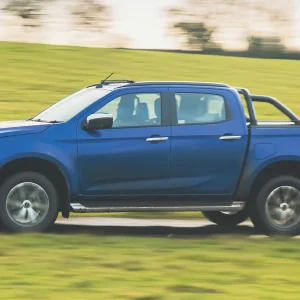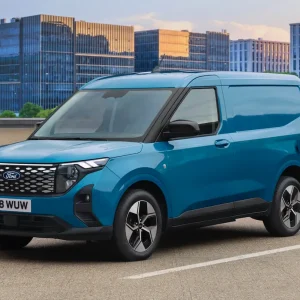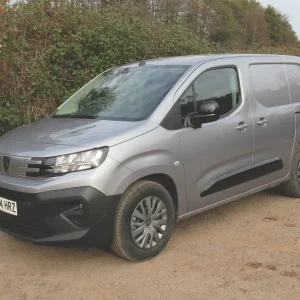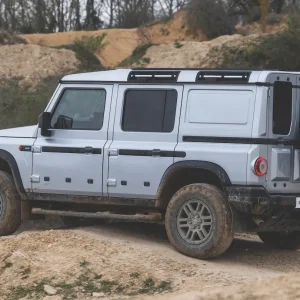Go back a few years and vans were the least glamorous conveyances on the highway. Viewed as humble, utilitarian tin boxes on wheels, they were there to do a job; and nothing more.
How times have changed. Ford and Volkswagen are among those manufacturers that have come to appreciate that small business owners and the self-employed in particular often want a lot more from vehicles they may spend more time in than they do in their own homes.
Naturally they want climate control, heated and electrically-adjustable seats and sophisticated on-board infotainment systems. What they may also want however, are stylish alloy wheels, low-profile tyres, spoilers and a fancy paint job with a liberal spattering of eye-popping decals.
What is more – and despite the fact that we’re all living through tough times – they’re willing to pay for the privilege.
Hence VW’s eagerness to promote the Sportline derivative of its iconic (an overused word, but justified in this context) front-wheel drive Transporter. Its styling tropes include 18in black alloy wheels, a distinctive red stripe across the front grille, illuminated chrome sill guards and a spoiler above the rear door.
It is produced in both short and long-wheelbase guise, and you can order it as a van or a Kombi.
Whichever variant you pick, power comes courtesy of a 204hp 2.0L BiTDI diesel married to VW’s utterly-superb seven-speed twin-clutch DSG (Direct Shift Gearbox) transmission. It can be used as either an auto or a manual.
We took delivery of the short-wheelbase van – and can’t pretend we didn’t enjoy getting to grips with what is undoubtedly a hugely attractive package.
Load bay
Access to the cargo area is by means of a sliding nearside door and a rear top-hinged hatch-type door supported by gas-filled struts. Both doors are opaque and feature powered latches.
Six load tie-down points are installed and a full-height steel bulkhead should ensure that unsecured items do not end up in the cab.
A ply lining protects the sides and doors from minor damage, the wheel-boxes are shrouded with protective covers and the floor covered with a tailored rubber mat.
Long-lasting LED lights illuminate both the load area and the cab interior.
Interior and equipment
In the past I’ve been a bit hard on VW’s van stylists and complained that their efforts have often resulted in vehicles that look far too bland both internally and externally. Not this time around.
Sportline features one of the coolest looking cab interiors I’ve ever encountered, with an attractive yet practical dashboard complete with gloss black inserts. Equipment includes Discover Media satellite navigation, an 8in touchscreen, which can offer access to streaming and internet services, a DAB radio and Bluetooth compatibility.
Two USB ports are on hand along with a pair of 12V power sockets.
Air conditioning, heated leather-trimmed seats complete with the Sportline logo and red stitching, adaptive cruise control with a speed limiter, driver and passenger airbags, electric windows and electrically-adjustable, heated and folding exterior mirrors are all included in the deal. Low-speed manoeuvring is a doddle thanks to front and rear parking sensors and a reversing camera.
The reach-adjustable leather-trimmed steering wheel is height-adjustable too. So is the driver’s seat, which comes with lumbar adjustment.
In-cab storage facilities include a pair of bins in each of the doors, a small lockable glove-box with shelves above it, and shelves on top of the fascia. Good to see a grab-handle on each of the A-pillars, and to see that the driver’s door sports a removable miniature rubbish bin.
You’ll find a cup-holder at each extremity of the dashboard, plus a third one next to the moulding that accommodates the gear shift.
The cab is a three-seater, which isn’t necessarily a good thing. That’s because anybody who occupies the middle seat will find the aforementioned moulding is crowding their right knee; not very comfortable, especially if you are embarking on a long journey.
Truth is that, like so many vans of its size, Transporter’s cab just isn’t wide enough to accommodate three people in comfort.
The comprehensive package of onboard safety systems includes ABS, Electronic Stability Programme, Brake Assist and Hill Start Assist.
Crosswind Assist is provided too – it’s there to stop your van being blown off-course into an adjacent lane if you encounter a sudden, strong crosswind on the motorway – as is Front Assist with City Emergency Braking System. If somebody casually wanders out in front of you as you’re heading down your local high street, then it will bring your van to a halt.
Traction Control System is present as well, as is an electronic diff lock, and can be switched off. So, of course, can the Stop/Start system, which features regenerative braking.
Still with safety, the front fog-lights boast a cornering function, the wipers come on automatically when it starts to rain on the heated windscreen, and the LED headlights dip automatically at night to avoid dazzling other drivers.
McPherson-strut-type suspension helps support the front of the vehicle while independent suspension with load-sensitive shock absorbers does duty at the rear. Eibach coil springs are fitted which lower the van by 30mm, enhancing its handling as well as its appearance.
Our demonstrator’s alloy wheels were shod with low-profile Hankook Ventus S1 Evo 3 255/45 R18 tyres.
Power-assisted electromechanical steering delivers an 11.9m turning circle.
Powertrain
Equipped with an intercooler, Sportline’s transversely-mounted four-cylinder in-line twin-turbo direct-injection common-rail diesel delivers maximum power at 4,000rpm. Top torque of 450Nm bites across a 1,400rpm–2,250rpm plateau.
A diesel particulate filter plus regular replenishment of the van’s 22L AdBlue reservoir help ensure that it maintains its Euro 6D exhaust emission status.
Driving
Strong acceleration from rest and up through the gears, plus the ability to maintain motorway speeds mile after mile without breaking sweat, mean that prospective owners have no need to worry about Sportline’s on-highway performance.
All that punch is delivered smoothly and steadily through an excellent DSG transmission that delivers a healthy kick-down whenever you need to sprint past slower-moving traffic. Push the gearshift lever to the right and you can change gear manually by pushing the lever backwards and forwards, but we stuck to the auto setting for 99% of the time and left the gearbox to its own devices.
All this is accompanied by sharp handling, partly due to the lowered height, that allows you to approach even quite tight bends with confidence. In-cab noise isn’t an issue bar a modest amount of bump and thump from the tyres and suspension, which between them deliver a pretty good ride.
Drawbacks? We reckon that our demonstrator’s brakes probably needed adjusting. Anything but the lightest of pressures on the pedal brought us to a screeching halt.
Fuel economy? We averaged 37mpg, just 0.5mpg shy of the official WLTP (Worldwide Harmonised Light Vehicle Test Procedure) figure.
Operating
Happily, our Sportline came with a conventional ignition system rather than a keyless set-up. We still have concerns about the latter approach from the security viewpoint.
Service intervals are set at two years/25,000 miles and Sportline is covered by a three-year/100,000-mile warranty, with roadside assistance provided for its entire duration. Further reassurance is provided by a 12-year anti-perforation corrosion warranty plus a three-year paint warranty.
No spare wheel, alas. You’ll have to do the best you can with an inflator/sealer.
You pay extra for metallic paint, which is somewhat surprising. Given the Sportline’s steep price tag we reckon the least VW can do is offer it as a no-cost option.
In our case it added £675 to the price but at least the front and rear bumpers and door handles get the same finish as the rest of the body.
Volkswagen Transporter T32 Sportline SWB 2.0 BiTDI 204hp 7spd DSG
Price (ex. VAT) £46,815
Price range (ex. VAT) £46,815–£51,530
Gross payload 1,165kg
Load length 2,572mm
Load width (min/max) 1,244mm/1,700mm
Load bay height 1,410mm
Load volume 5.8m3
Loading height 538mm
Rear door aperture 1,473mm x 1,299mm
Side door aperture 1,017mm x 1,282mm
Gross vehicle weight 3,200kg
Braked trailer towing weight 2,500kg
Residual value 26.39%*
Cost per mile 84.78p
Engine size/power 1,968cc/204hp @4,000rpm
Torque 450Nm @1,400–2,250rpm
Gearbox 7-spd DSG
Fuel economy 37.5mpg (combined WLTP)
Fuel tank 70L
CO2 208g/km (WLTP)
Warranty 3yrs/100,000mls
Service intervals 2yrs/25,000mls
Insurance group 40E
Price as tested £47,490
* after 48 months/20,000mls p.a – source – KWIKcarcost
Options
Metallic paint £675
Rivals
Ford Transit Custom
Price (ex. VAT) £28,145–£57,955
Load volume 6.0–8.3m3
Gross payload 686–1459kg
Engines 105hp, 130hp, 170hp 2.0 diesel
Verdict: The Transit Custom continues to cut a swathe through the light commercial market. Its ride handling and overall performance easily match and often exceed the bulk of its competitors, used prices are robust, and it seems there are Ford dealers everywhere. An electric version will be launched in 2023 and next year’s Custom will also be the template for the next VW Transporter thanks to VW and Ford’s joint-venture agreement. In the meantime check out the plug-in hybrid variant and the MS-RT.
Renault Trafic
Price (ex VAT) £27,450–£39,650
Load volume 5.8–8.9m3
Gross payload 935–1,251kg
Engines 110hp, 130hp, 150hp, 170hp 2.0 diesel
Verdict: Plenty of positives and the dual-clutch automated transmission is impressive – we prefer it to the manual – but it is not quite a Transporter beater. It’s not far behind though, and it is also sold in rebadged guise by Nissan. Renault Trucks dealers have started selling it too this year, and are the only ones to offer it as a chassis platform alongside the van. The truck builder has come up with some special editions too, and truck dealers can service your van late at night. An electric Trafic should be here next year.
Vauxhall Vivaro
Price (ex VAT) £28,753–£43,381
Load volume 5.3–6.1m3
Gross payload 975-1,458kg
Engines 100hp, 120hp 1.5 diesel, 145hp 2.0 diesel, 100kW electric motor
Verdict: Vauxhall’s electric Vivaro is a success, though the diesel models should not be ignored given that they offer adequate fuel economy. Vivaro is also marketed by Citroen as the Dispatch, Peugeot as the Expert and Fiat Professional as the Scudo; as all four brands are owned by Stellantis. The same model is also sold by Toyota as the Proace thanks to a joint venture with Stellantis; so cast your eye over the accompanying packages from each brand before you decide.
The Final Verdict
Design 9/10 – High style and practicality make the Sportline stand out in the high street
Cabin 7/10 – Pleasant and stylish environment, but not wide enough to seat three in comfort
Ride 8/10 – Copes well with Britain’s woefully-uneven highway surfaces
Refinement 7/10 – High build quality and in-cab noise not an issue, though brakes may need adjustment
Load area 8/10 – Does what it says on the tin, with front-wheel-drive delivering a low loading height
Handling/performance 9/10 – Both are a great standard, with effective response whenever you put your foot down
Engine/transmission 10/10 – An astonishingly-good combination. The DSG box cannot be faulted
Standard equipment 8/10 – Plenty of in-cab benefits and VW’s on-board safety systems must be applauded
Operating costs 7/10 – Thorough warranty and dealer network is known for effective aftersale support
What Van? subjective rating 9/10 – Not cheap, agreed, but it’s a fabulous package that is highly unlikely to disappoint
Overall Rating = 82/100





